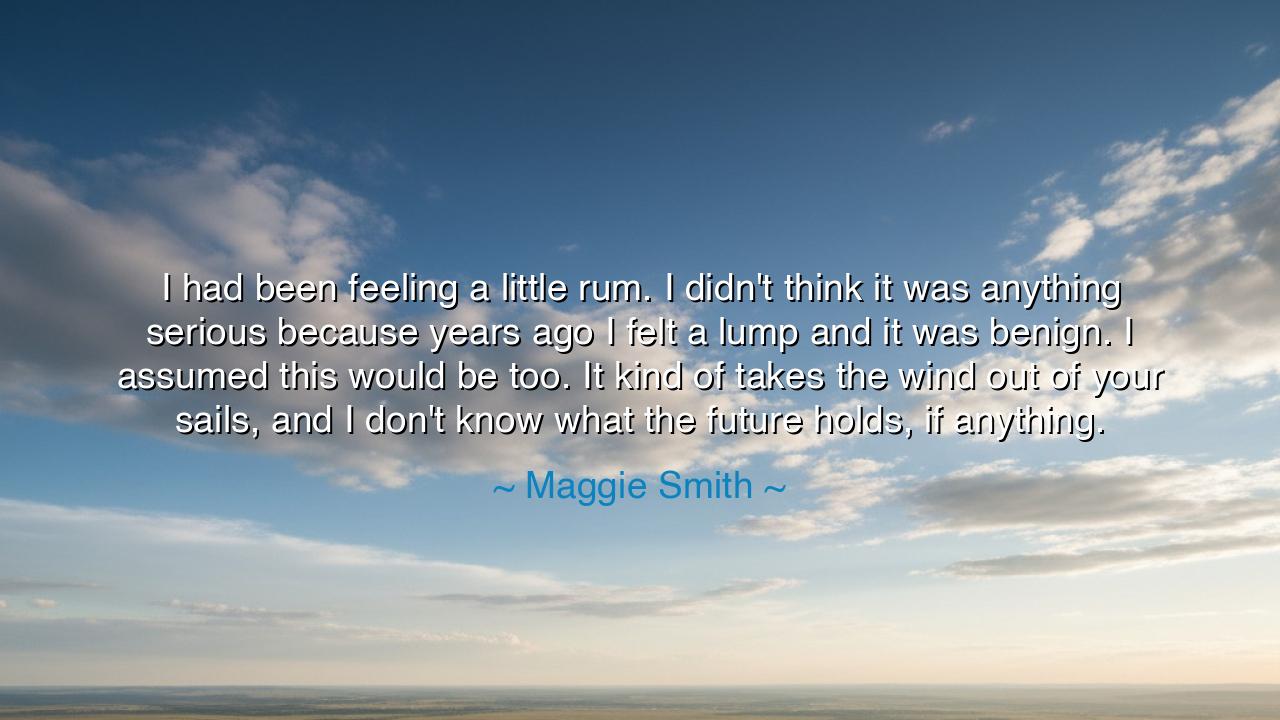
I had been feeling a little rum. I didn't think it was anything
I had been feeling a little rum. I didn't think it was anything serious because years ago I felt a lump and it was benign. I assumed this would be too. It kind of takes the wind out of your sails, and I don't know what the future holds, if anything.






"I had been feeling a little rum. I didn't think it was anything serious because years ago I felt a lump and it was benign. I assumed this would be too. It kind of takes the wind out of your sails, and I don't know what the future holds, if anything." – Maggie Smith.
In these simple yet profound words, Maggie Smith shares a moment of vulnerability, a recognition of the fragility of life. She speaks of a physical sensation, a feeling of unease that initially seemed insignificant, only to be confronted with the uncertainty that comes when something once benign suddenly carries the weight of potential danger. Her words reflect a deep human truth: that life, for all its joys and assurances, is unpredictable, and we are often faced with moments where the future seems shrouded in uncertainty.
In the teachings of the ancient philosophers, there was a recurring theme of acceptance in the face of uncertainty. Socrates, when confronted with the knowledge of his own death, famously said that he was not afraid of the unknown, for he did not see death as an enemy. Rather, he embraced the mystery of life’s journey. Similarly, Smith’s words speak to the human condition, where even the most certain aspects of life—health, love, and time itself—can shift in an instant. In the face of such uncertainty, one must cultivate grace and strength, accepting that we are but travelers on a winding path, not knowing what lies ahead but finding the courage to keep moving forward.
The ancient Greeks also believed in the impermanence of life, encapsulated in the word "kairos"—the opportune moment. This moment, though fleeting, is the only time we truly have, and how we respond to the uncertainty of life is what defines us. In the face of an unknown future, much like Smith’s quiet admission of uncertainty, the Stoics would encourage us to live fully in the present, to accept the limitations of our knowledge, and to trust that we have the strength to endure whatever comes our way. Smith’s words, though deeply personal, carry this Stoic wisdom: we do not know what tomorrow holds, but we must be ready to face it with courage and dignity.
Consider the life of Marcus Aurelius, the Roman emperor and Stoic philosopher, who also faced the fragility of life in his own health and the constant pressures of leadership. In his writings, particularly in the Meditations, Aurelius reflects on the importance of embracing the present moment and recognizing that suffering is an inevitable part of existence. He teaches us that it is not the hardships themselves that define us, but how we choose to meet them. Just as Maggie Smith is confronted with the uncertainty of her health, Aurelius reminds us that the only certainty in life is change, and the key is in our response to that change. Life is unpredictable, but it is how we choose to face it that reveals our true character.
The metaphor of “taking the wind out of your sails” in Smith’s statement speaks to a universal experience—the disruption of our plans, the sudden halting of momentum. It is a moment when everything seems to pause, and we are left questioning the path ahead. Such moments are like storms on the open sea, where we feel tossed about by forces beyond our control. But even in the tempest, the ancient mariners understood that they must continue to steer their vessels, adjusting their sails to the changing winds. Smith’s reflection is not merely a lament for what might come, but an acknowledgment of the difficult beauty that comes with the unknown. It is a lesson in resilience, a reminder that even when the future seems uncertain, we must remain anchored in the present and keep our course steady.
From a practical standpoint, Smith’s honesty offers a profound lesson in how to live with uncertainty. In our own lives, we must learn to confront fear not by avoiding it, but by facing it with compassion for ourselves and with trust in our own resilience. Whether facing an illness, a personal crisis, or simply the unknowing future, the wisdom of the ancients tells us that we must not be paralyzed by what we cannot control. Instead, we must continue to live with purpose, to embrace each moment, and to trust that whatever the future holds, we have the capacity to meet it with strength and wisdom.
So let us take Smith’s reflection as a call to live mindfully, knowing that life’s uncertainties are inevitable, but that we are never without the power to choose how we respond. Just as Socrates embraced death with serenity, and Marcus Aurelius faced the challenges of life with grace, we too can face the unknown with a heart full of courage and a spirit anchored in the present. For in the end, the future remains unknown, but the strength with which we face it is entirely within our hands. Live fully, live bravely, and trust that, no matter what comes, we will find our way forward.






AAdministratorAdministrator
Welcome, honored guests. Please leave a comment, we will respond soon